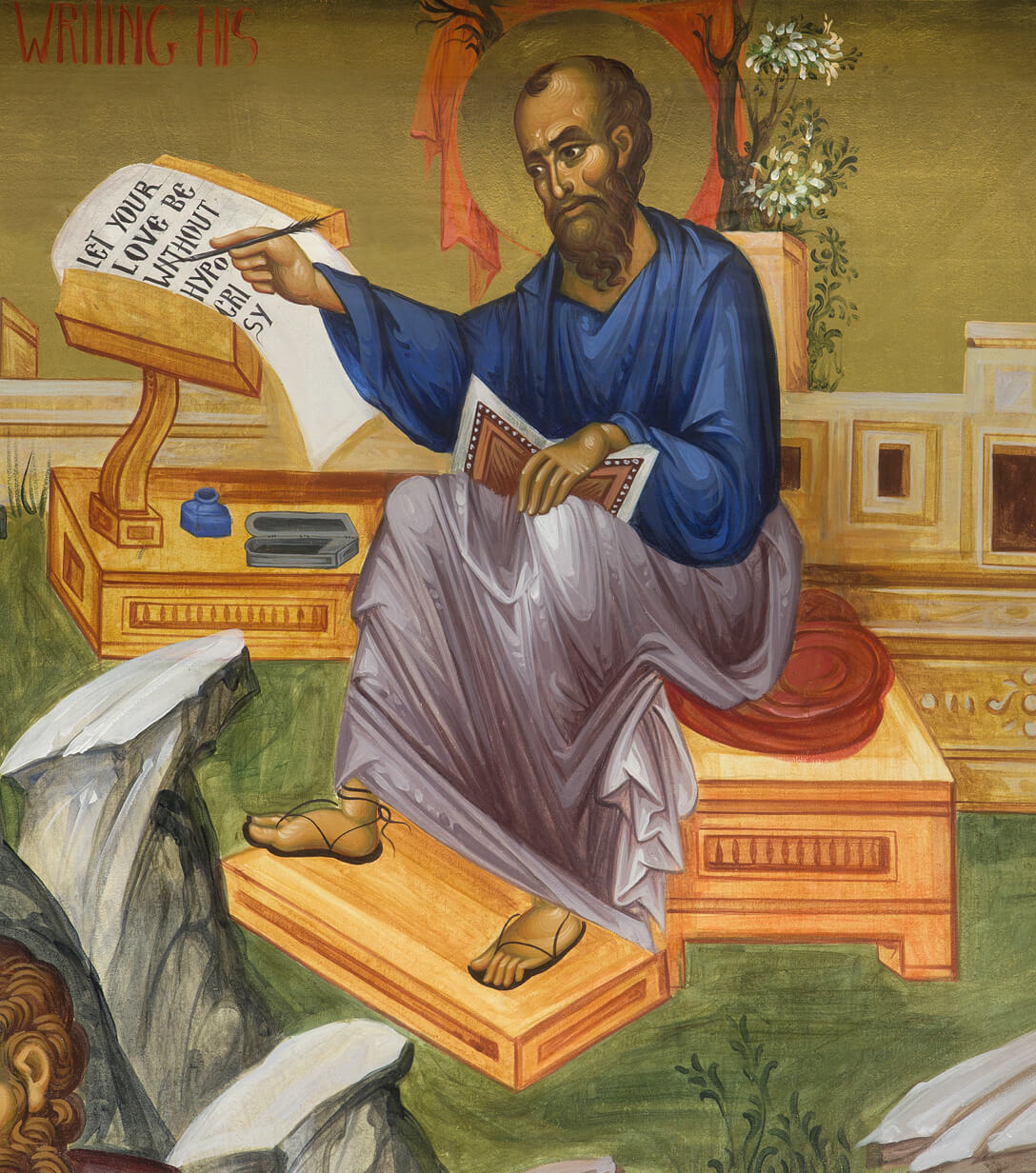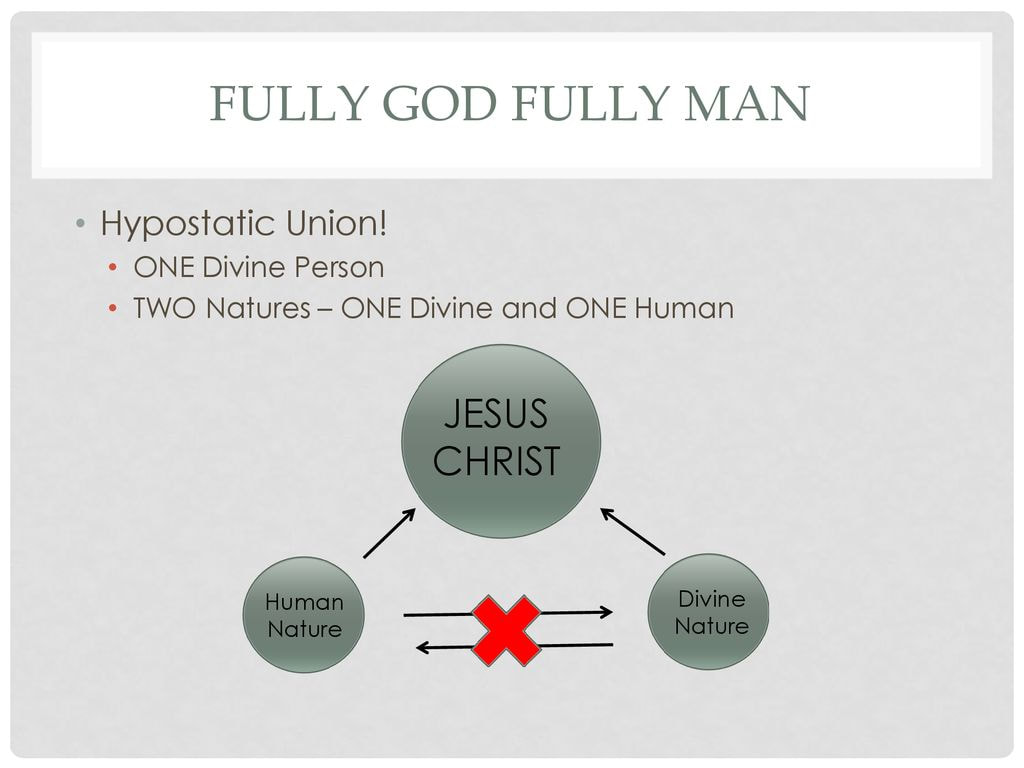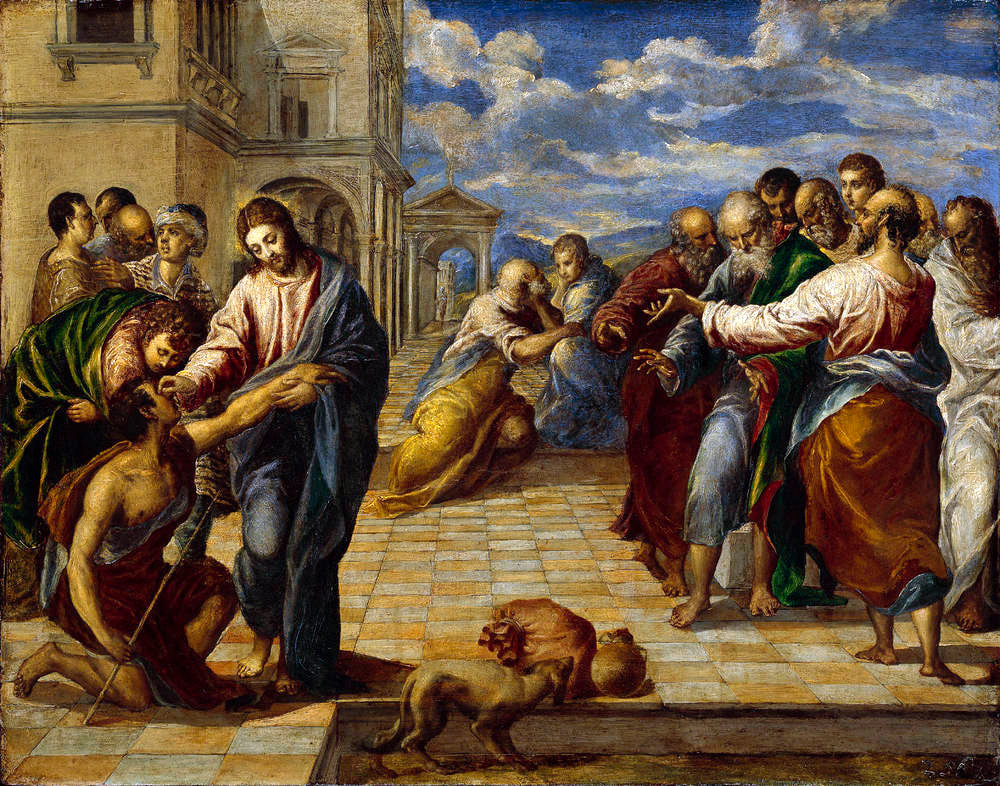Yet He Wanted Timothy to Bring Him Books to Read!
"For the word of God is alive and active. Sharper than any double-edged sword, it penetrates even to dividing soul and spirit, joints and marrow; it judges the thoughts and attitudes of the heart."
Writing around AD 64-65,
the Apostle Paul appended a request in his letter to his
pastoral protégé and friend Timothy:
When you come, bring the cloak that I left with Carpus at Troas,
also the books, and above all the parchments.
(2 Tim. 4:13)
He is inspired, and yet he wants books!
He has been preaching at least for thirty years, and yet he wants books!
He had seen the Lord, and yet he wants books!
He had had a wider experience than most men, and yet he wants books!
He had been caught up into the third heaven, and had heard things which it was unlawful for a men to utter, yet he wants books!
He had written the major part of the New Testament,
and yet he wants books!
The apostle says to Timothy and so he says to every preacher,
"Give thyself unto reading.”
The man who never reads will never be read; he who never quotes will never be quoted. He who will not use the thoughts of other men’s brains, proves that he has no brains of his own.
Brethren, what is true of ministers is true of all our people.
You need to read.
Renounce as much as you will all light literature, but study as much as possible sound theological works, especially the Puritanic writers, and expositions of the Bible. We are quite persuaded that the very best way for you to be spending your leisure, is to be either reading or praying. You may get much instruction from books which afterwards you may use as a true weapon in your Lord and Master’s service.
Paul cries,
"Bring the books”
--join in the cry.
A fortiori—tolle lege!
There is much we can learn from the life of the apostle Paul. Far from ordinary, Paul was given the opportunity to do extraordinary things for the kingdom of God. The story of Paul is a story of redemption in Jesus Christ and a testimony that no one is beyond the saving grace of the Lord. However, to gain the full measure of the man, we must examine his dark side and what he symbolized before becoming “the Apostle of Grace.” Paul’s early life was marked by religious zeal, brutal violence, and the relentless persecution of the early church. Fortunately, the later years of Paul’s life show a marked difference as he lived his life for Christ and for the advancement of His kingdom.
Paul was actually born as Saul. He was born in Tarsus in Cilicia around AD 1–5 in a province in the southeastern corner of modern-day Tersous, Turkey. He was of Benjamite lineage and Hebrew ancestry (Philippians 3:5–6). His parents were Pharisees—fervent Jewish nationalists who adhered strictly to the Law of Moses—who sought to protect their children from “contamination” from the Gentiles. Anything Greek would have been despised in Saul’s household, yet he could speak Greek and passable Latin. His household would have spoken Aramaic, a derivative of Hebrew, which was the official language of Judea. Saul’s family were Roman citizens but viewed Jerusalem as a truly sacred and holy city (Acts 22:22-29).
At age thirteen Saul
was sent to Judea
to learn from a rabbi named Gamaliel,
under whom Saul mastered Jewish history,
the Psalms,
and the works of the prophets.
His education would continue for five or six years
as Saul learned such things as dissecting Scripture
(Acts 22:3).
It was during this time that he developed a
question-and-answer style of teaching
known in ancient times as
"diatribe.”
This method of articulation helped rabbis debate the
finer points of Jewish law to
either defend or prosecute those who broke the law.
Saul went on to become a lawyer,
and all signs pointed to his becoming a member of the Sanhedrin,
the Jewish Supreme Court of 71 men who ruled over Jewish life and religion.
Saul was zealous for his faith,
and this faith did not allow for compromise.
It is this zeal that led Saul down the path of religious extremism.
In Acts 5:27–42,
Peter delivered his defense of the gospel
and of Jesus
in front of the Sanhedrin, which Saul would have heard.
Gamaliel was also present and delivered a message to calm the council and prevent them from stoning Peter. Saul might also have been present at the trial of Stephen. He was present for his stoning and death; he held the garments of those who did the stoning
(Acts 7:58).
After Stephen’s death,
"a great persecution broke out against the church in Jerusalem"
(Acts 8:1).
Saul became determined to eradicate Christians,
ruthless in his pursuit as he believed
he was acting in the name of God.
Arguably, there is no one more frightening or more vicious
than a religious terrorist,
especially when he believes he is doing
the will of the Lord by killing innocent people.
This is exactly what Saul of Tarsus was: a religious terrorist.
Acts 8:3 states,
"He began ravaging the church,
entering house after house, and dragging off men and women,
he would put them in prison.”
The pivotal passage in Paul’s story is Acts 9:1–22,
which recounts
Paul’s meeting with Jesus Christ on the
road from Jerusalem to Damascus,
a journey of about 150 miles.
Saul was angered by what he had seen and filled with murderous rage against the Christians. Before departing on his journey, he had asked the high priest for letters to the synagogues in Damascus, asking for permission to bring any Christians (followers of “the Way,” as they were known) back to Jerusalem to imprison them.
On the road Saul was caught in a bright light from heaven
that caused him to fall face down on the ground.
He heard the words, “Saul, Saul, why are you persecuting me?”
He replied, “Who are you Lord?” Jesus answered directly and clearly,
"I am Jesus, whom you are persecuting”
As an aside, this might not have been Saul’s first encounter with Jesus, as some scholars suggest that young Saul might have known of Jesus and that he might have actually witnessed His death.
From that moment on,
Saul’s life was turned upside down.
The light of the Lord blinded him, and as he traveled on he had to rely on his companions.
As instructed by Jesus, Saul continued to Damascus to make contact with a man named Ananias, who was hesitant at first to meet Saul because he knew Saul’s reputation as an evil man. But the Lord told Ananias that Saul was a “chosen instrument” to carry His name before the Gentiles, kings, and the children of Israel (Acts 9:15) and would suffer for doing so (Acts 9:16). Ananias followed the Lord’s instructions and found Saul, on whom he laid hands, and told him of his vision of Jesus Christ. Through prayer, Saul received the Holy Spirit (Acts 9:17), regained his sight, and was baptized (Acts 9:18). Saul immediately went into the synagogues and proclaimed Jesus as the Son of God (Acts 9:20). The people were amazed and skeptical, as Saul’s reputation was well known. The Jews thought he had come to take away the Christians (Acts 9:21), but he had in fact joined them. Saul’s boldness increased as the Jews living in Damascus were confounded by Saul’s arguments proving that
Jesus was the Christ
(Acts 9:22).
Saul spent time in Arabia, Damascus, Jerusalem, Syria, and his native Cilicia, and Barnabas enlisted his help to teach those in the church in Antioch
(Acts 11:25).
Interestingly,
the Christians driven out of Judea
by the persecution that arose after Stephen’s death
founded this multiracial church
(Acts 11:19–21).
Saul took his first of three missionary journeys in the late AD 40s.
As he spent more time in Gentile areas,
Saul began to go by his Roman name Paul
(Acts 13:9).
Paul wrote many of the New Testament books,
including Romans, 1 and 2 Corinthians, Galatians, Philippians, 1 and 2 Thessalonians, Philemon, Ephesians, Colossians, 1 and 2 Timothy, and Titus. These thirteen “letters” (epistles)
make up the “Pauline Authorship” and are the
primary source of his theology.
As previously noted, the book of Acts gives us a historical look at Paul’s life and times. The apostle Paul spent his life proclaiming the risen Christ Jesus throughout the Roman world, often at great personal peril
(2 Corinthians 11:24–27).
Paul died a martyr’s death in the mid-to-late AD 60s in Rome.
So, what can we learn from the life of the apostle Paul?
First,
we learn that God can save anyone.
The remarkable story of Paul
Repeats itself Every Day
as sinful, broken people all over the world
are transformed by
God’s saving grace in Jesus Christ.
Every person walking this planet is sinful, we can't escape that fact if human nature. Some of these people have done despicable things to other human beings, while some just try to live a moral life thinking that God will smile upon them on the day of judgment. When we read the story of Paul, we are amazed that God would allow into heaven a religious extremist who murdered innocent women and children. Today, we might see terrorists or other criminals as unworthy of redemption because their crimes against humanity are just too great. The story of Paul is a story that can be told today--he isn’t "worthy in our eyes" of a second chance, yet
God granted him mercy.
The TRUTH is that
every person matters to God,
from the “good, decent,” average person to the “wicked, evil,” degenerate one. Only God and his saving grace can redeem and save.
Second,
we learn from the life of Paul that anyone can be a
humble, powerful
witness for Jesus Christ.
Arguably, no other human figure in the Bible demonstrated more humility while sharing the gospel of Jesus Christ as Paul. Acts 20:19 tells us that he “served the Lord with all humility and with tears and with trials that happened to [him] through the plots of the Jews.” In Acts 28:31,
Paul shares the
good news of Jesus Christ
'Boldly and without hindrance he preached the kingdom of God and taught about the Lord Jesus Christ.”
Paul was not afraid to tell others what the Lord had done for him.
Paul spent all his days, from conversion to martyrdom,
working tirelessly for the kingdom of God.
We learn that anyone can surrender completely to God.
Paul was fully committed to God.
In Philippians 1:12–14, Paul wrote from prison,
"I want you to know, brothers, that what has happened to me has really served to advance the gospel, so that it has become known throughout the whole imperial guard and to all the rest that my imprisonment is for Christ. And most of the brothers, having become confident in the Lord by my imprisonment,
are much more bold to speak the word without fear.”
Despite his circumstances,
Paul praised God and continually shared
the good news.
(see also Acts 16:22–25 and Philippians 4:11–13).
Through his hardships and suffering, Paul knew the outcome of a life well lived for Christ. He had surrendered his life fully, trusting God for everything. He wrote, “For to me to live is Christ, and to die is gain” (Philippians 1:21).
The writer of Hebrews informs readers that God’s Word is more than simply a historical record of events and people:
“For the word of God is living and active. Sharper than any double-edged sword, it penetrates even to dividing soul and spirit, joints and marrow; it judges the thoughts and attitudes of the heart”
(Hebrews 4:12).
In this passage, Word of God refers to His revelation in a general sense, meaning any method God uses to communicate with humans. Our primary exposure is through His written Word, the Bible.
We learn in Scripture that the
Word of God is
alive and active—it not only lives but works.
Let’s explore these two characteristics of
God's revelations to mankind
The original Greek word translated here as
"living” means “to have life” or “alive.”
The Word of God is
alive because God is a living God
(Hebrews 3:12). Jesus said, “The very words I have spoken to you are spirit and life” (John 6:63, NLT). In the parable of the sower,
Jesus compared God’s Word to seed
(Matthew 13:1–23).
Seed, like the Word, is a
living organism that,
when spread and planted in fertile soil,
produces abundant life.
Christians are made alive spiritually and eternally because we are “born again, not of perishable seed, but of imperishable, through the living and enduring Word of God” (1 Peter 1:23). Believers “enter God’s eternal rest” (receive God’s free gift of salvation by grace through faith alone and not by self-effort, Ephesians 2:8–9) through the life-giving power of God’s Word. This TRUTH is the main point the writer of Hebrews has been driving home in the previous verses (Hebrew 4:1–11), that no one can enter God’s true rest except those in whom God’s message has taken deep root and complete control. God does the work of salvation by the power of His Word when we submit to God’s dominion and
trust Him to save us through
Christ’s sacrifice on the cross.
The term active in Hebrews 4:12 means “effective, powerful, producing or capable of producing an intended result.” The Word of God is vibrant, dynamic, energizing, and productive. It is not static or idle in the lives of genuine believers. The apostle Paul explained that the
Word of God is “at work in you who believe”
(1 Thessalonians 2:13).
God’s Word is powerful,
not only to give life, but also to deliver warnings and bring judgment and punishment to the disobedient: “Is not my Word like fire, declares the LORD, and like a hammer that breaks the rock in pieces?” (Jeremiah 23:29, ESV).
God’s living Word is not something to read or listen to passively and then forget. James taught Christians to look “intently into
the perfect law that gives freedom”
and to focus on it by doing what it says (James 1:23–25). Paul told Timothy, “All Scripture is inspired by God and is useful to teach us what is true and to make us realize what is wrong in our lives. It corrects us when we are wrong and teaches us to do what is right. God uses it to prepare and equip his people to do every good work” (2 Timothy 3:16–17, NLT). If we let God’s message do its work deep inside, it will change our character and behavior.
Astonishing,
life-generating things happen when God’s Word goes forth.
It is fully capable of accomplishing its purpose:
“The rain and snow
come down from the heavens
and stay on the ground to
water the earth.
They cause the grain to grow,
producing seed for the farmer and
bread for the hungry.
It is the same with my word. I send it out,
and it always produces fruit.
It will accomplish all I want it to,
and it will prosper everywhere I send it”
(Isaiah 55:11, NLT).
On the Day of Pentecost, when Peter preached the message of salvation in Jesus Christ, those who heard it “were cut to the heart” (Acts 2:37), and about three thousand people were saved (Acts 2:41).
The author of Hebrews described the Word of God as “sharper than any double-edged sword.” Paul called it “the sword of the Spirit, which is the Word of God” (Ephesians 6:17). This sword imagery also appears in Isaiah 49:2, Revelation 1:16, and Revelation 2:12. As a sharp, double-bladed sword, the Word of God is our definitive offensive weapon against the assaults of a spiritual enemy. When Satan tempted our Lord in the wilderness, Jesus wielded the sword of God’s Word to counter the devil’s attacks (Matthew 4:4). His example teaches us to do the same.
The vital power of God’s message exists in its ability to pierce and penetrate the innermost depths of the human soul. It can cut through any obstacle to access and inspect our unspoken thoughts and hidden secrets (Matthew 10:26; Luke 8:17; 12:2; Mark 4:22).
It can cross-examine and judge the attitudes of our hearts.
Because the Word of God is living and active,
Peter encouraged Christians to pay close attention to it (2 Peter 1:19).
May we let it be a lamp to guide our feet and a
light to illuminate our path through
this life.
(Psalm 119:105).





















 RSS Feed
RSS Feed





















































